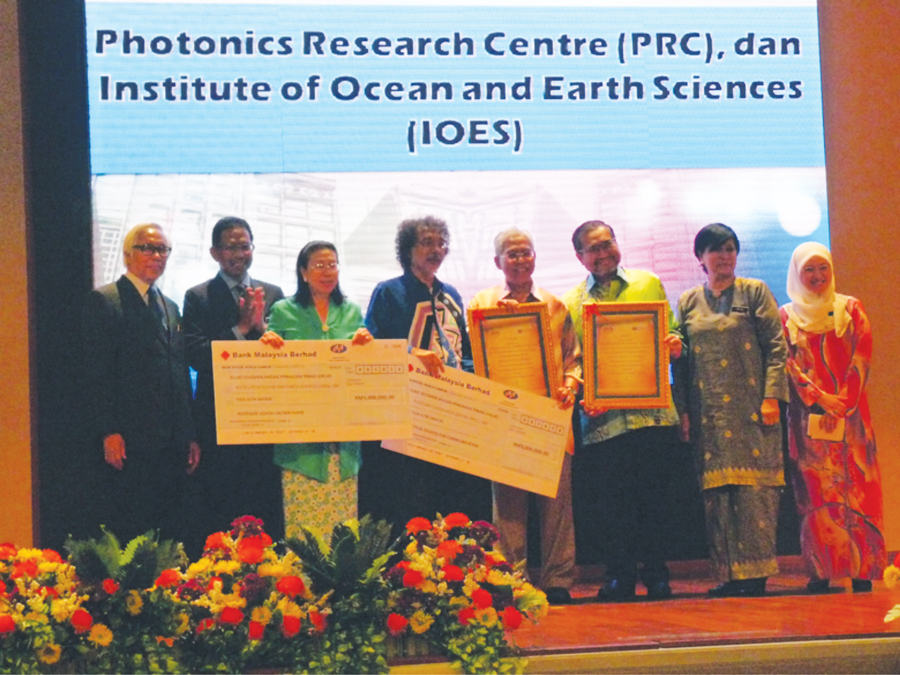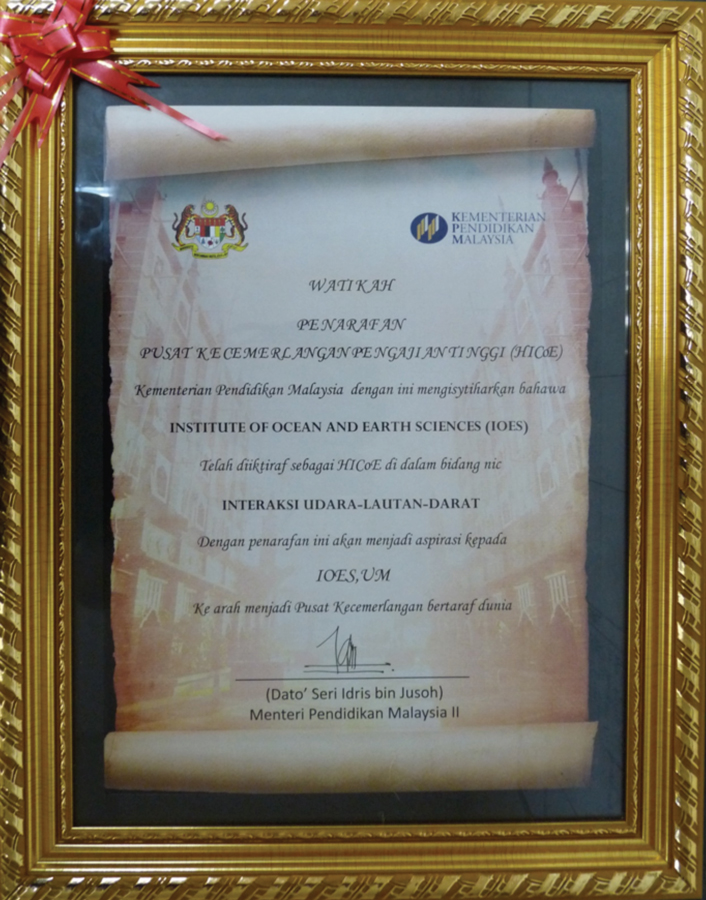In October 2014, the IOES was awarded the prestigious High Institution Centre of Excellence (HICoE) by the Ministry of Higher Education Malaysia, in recognition of its leadership in the niche area of “Air-Ocean-Land Interactions”. The IOES addresses MOHE’s priority area of Environment and Climate. In 2019, based on its excellent achievements especially under the HICoE Programme, the IOES was further recognized by Ministry of Higher Education Malaysia with the award of the High Institution Centre of Excellence (HICoE) Phase II status.
Under the HICoE programme, the IOES is conducting research in the niche area of “Air-Ocean-Land Interactions”. Under the theme of ‘Air-Ocean-Land Interaction”, members from various disciplines of microbiology, biotechnology, meteorology, chemistry and social sciences have have joined forces to address important global and environmental issues like climate change. Amongst the strengths in IOES are: Prof. Dato’ Dr Azizan Abu Samah, who is well known for his Antarctic atmospheric research; Assoc. Prof. Dr Lim Po Teen, one of the region’s experts in harmful algae blooms (HAB); Assoc. Prof. Dr Siti Aisyah Alias, the only marine fungi expert in the region; Assoc. Prof. Dr Lee Choon Weng, active marine microbiologists; and Prof. Dr Lim Phaik Eem and Prof. Dr Phang Siew Moi, who are recognized internationally for their algal research.
HICoE Niche: Air-Ocean-Land Interactions
Main Focus:
i. To understand the influence of Air-Ocean-Land Interactions on land and its biota through transdisciplinary approaches
ii. To direct these Interactions to the forecasting of storms & other impacts, their mitigation and to useful applications
iii. To contribute to management of the regional and global climate and environment.
The HICoE research is conducted through projects within the 3 programmes as shown below:
a) Programme 1: Towards a better understanding on variabilities in atmospheric and oceanic processes, transboundary air pollution under a changing climate
b) Programme 2: Towards a better understanding on the drivers and their interactions that influence the coastal ecosystem under a changing climate.
c) Programme 3: Determining the interaction of various climate change parameters on algae and fungi by using ‘omics’ approaches
The Institute of Ocean and Earth Sciences (IOES), University of Malaya has its roots in the University of Malaya Maritime Research Centre (UMMReC) which was established in 2003 in response to the national call for more concerted research in the marine sciences, considering the importance of Malaysia’s abundant marine heritage as well as to coordinate and lead all research activities and consultancies in marine and maritime research at the University of Malaya. The establishment of IOES was approved by the University of Malaya Management on 23 October 2007 and officially launched on 17 January 2008. The IOES was approved by the University of Malaya Board of Directors and under the management of Deputy Vice-Chancellor Office (Research & Innovation) on 17 April 2008.
The IOES received further accolade by being recognised as a Marine Centre of Excellence (COE) under the National Oceanography Directorate (NOD), Ministry of Science, Technology and Innovation. The uniqueness of IOES lies in its multidisciplinary team of distinguished researchers who are leading scientists in the areas of mangrove ecology, algae biotechnology, coastal eco-engineering, air-ocean interaction and climate change, maritime law and maritime culture. In the IOES, the blend of natural scientists and social scientists provide a formidable team to respond to both scientific and socio-economic issues confronting the coastal and maritime systems.
The Institute of Ocean and Earth Sciences (IOES), conducts research and undertakes education and technology development in ocean and earth sciences. The research mission of this institute is to achieve international excellence, lead in national and regional research programmes, and to be a leading academic centre for ocean and earth sciences in the region. The function of the Institute is three-pronged: Research, Academic Training and Technology Development, which it carries out through its members helming 4 Research Units, namely
Marine Biodiversity and Coastal Studies Unit
Marine Biotechnology Research Unit
Air-Ocean-Land Interaction Studies and Climate Change Research Unit
Maritime Community, Law, Policy and Governance Unit
The main strengths of IOES lie in the diversity, depth and range of expertise available, particularly in the rare expertise of maritime law and policy, political science and international relations, socio-economics, maritime history, culture and geopolitics, climate change, marine geology, mangrove ecology, marine biotechnology, marine biodiversity and marine genomics. These combined research strengths, unique in the Malaysian scenario, will allow IOES to integrate multidisciplinary approaches to the study of fundamental scientific problems and to discover new and novel products and processes in our oceans.
Since its establishment in 2008, IOES has researched and published widely on areas of tropical marine biodiversity and ecology, marine biotechnology, coastal rehabilitation and engineering, air-ocean-earth interactions, and established the “Journal of Maritime Culture and Geopolitics“, the first such journal in the country. This is addition to the IOES Monograph Series that is published by the IOES.


Last Update: 28/08/2022